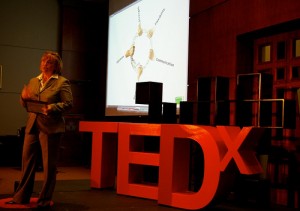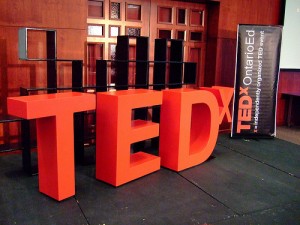TEDxOntarioED Talk April 9, 2010, LONDON
On Friday night, I was honoured to be invited to speak at the TEDxOntarioEd event in London, Canada.
“Remember, it’s about people”
[NOTE: The title is a quote from Sir Ernest Henry Shackleton, an Anglo-Irish Explorer. His unique leadership skills gained legendary acclaim because he managed to return from a harrowing trans-antarctic expedition with no lives lost. He understood that whatever the quest, we must not lose sight of what really matters in the pursuit of our goals.]
Video:
TEDxOntarioEd -Kathy Hibbert 04/09/10
Text of talk:
I was invited to speak to you tonight about the role that student motivation has played in my life and work. For me, the seeds of these lessons were planted early. When I was a pre-teen growing up in rural Ontario, my family sponsored a young Vietnamese family as they began a new life in Canada. Even then, I relished the role of teacher. But it was years before I understood that while I had taught my adopted family to read and write the ‘word,’ once we shared a language, they taught me about the world.
As a new teacher in the early 80s , I experienced an annual change in teaching assignment. Perpetual learning became my reality. However, as I worked with colleagues and students developing new curriculum each year, I learned that engaging in creative intellectual work fed my teaching and nurtured my spirit.
Malcolm Gladwell has suggested that three things – autonomy, complexity and a connection between effort and reward are necessary for work to be satisfying. Similarly, Daniel Pink argues that autonomy, mastery and purpose create conditions for people to do their best work. I thought back nearly twenty years ago, to a time when I was working with about 400 students across a large geographic area. They approached me and asked to build a website. I had no idea how to go about it (as this was before the days when we had access to programs like Dream Weaver), so three students in grade 5 sat down and patiently taught me enough HTML coding to develop the site. Was it complex? You bet! Did we have autonomy – we sure did, and it was immensely rewarding. I learned that satisfaction and motivation are powerful allies!
In the mid-nineties, the introduction of standardized curriculum and assessment procedures saw ‘professional development’ devolve into ‘training’. Autonomy evaporated. Purpose was determined from ‘above’, and prior mastery was irrelevant. Instead of working with colleagues to build upon our ideas, experiences, and theories, I traveled outside of our region to receive ‘training’ in order that I may return to ‘train-a-trainer’ at each school. Although this is apparently considered ‘economically efficient’, for me, this process was the antithesis of good teaching and professionalism. I learned that dissatisfaction was a powerful drain on motivation.
I began to wonder how teachers could sustain creating engaging experiences for students in classrooms when their own creativity and intellect was ignored over the long term. What do we lose when we condition a talented body of professionals not to ‘think’, but just ‘do’? I find it ironic that as the world around us begins to open up and share knowledge in new and creative ways, (like so many of the examples we have heard about tonight at this TEDx Talk) our schools have increased monitoring and surveillance in a quest to ensure that we raise scores on a single standardized test. We need to be concerned about this. Do we want (and can we afford) to simply graduate individuals who have demonstrated proficiency at following instructions – at a time when success in the global economy is dependent upon innovative thinking?
Recently my work has focused on ways in which digital resources support learning. [See ATM Confessions ]. Since our adolescents are the lead users of technology, I invited them to participate in this inquiry. One of these students, dismayed by what he perceived to be a resistance to technology in his classroom, uttered the familiar idiom, “you can lead a horse to water but you can’t make it drink”. Well, horses are not unlike people. It is part of human nature to resist forces that limit our autonomy. But if we reframe our thinking about this however, we may open up possibilities. The question ‘How might we arouse thirst’, acknowledges our natural desire for meaning.
It is why my current multiliteracies project is called The Salty Chip. This project trusts in the power of engaged teachers and students working together. It honors and respects the different places we all are in our learning, and in our use of emerging technologies.
A balanced intake of salt is essential to our physical life. Too much leads to health problems; too little can lead to death. It might be worth considering the ‘fluid balance’ in our intellectual diets. How often do we feel intellectually dehydrated when ‘training’ ignores the principles of differentiated instruction?
What kind of a legacy are we leaving our students, and the teachers who follow us? I think it is time to shift the discourse in education — from one steeped for too long in the dominant discourse of management, accountability and measurement –to one of inspiration, engagement and hope. Hope that our schools can move beyond the factory model, and its factory mentality; to spaces that are more relevant to the 21st century ideas that have ignited a new generation -illustrated by the wonderful examples that have been shared this evening. Hope that teachers and students can be freed to engage as learners together in ways that leave us all full, satisfied and thirsty for more!


Pingback: Tweets that mention TEDxOntarioED Talk April 9, 2010, LONDON | The Salty Chip Blog -- Topsy.com